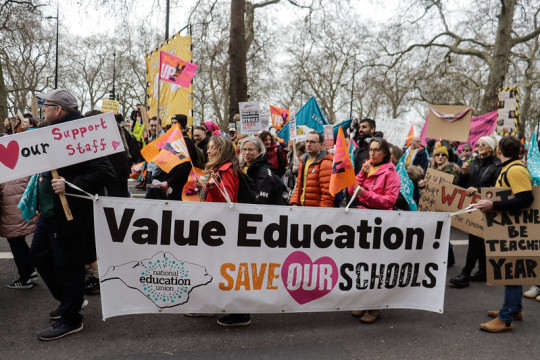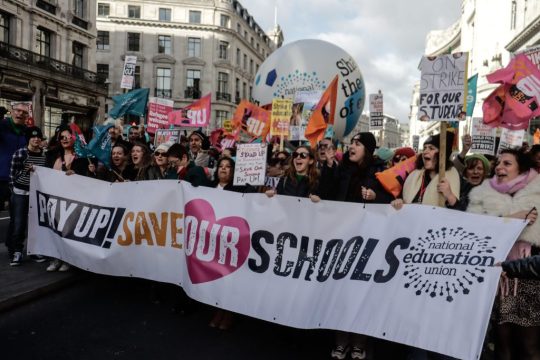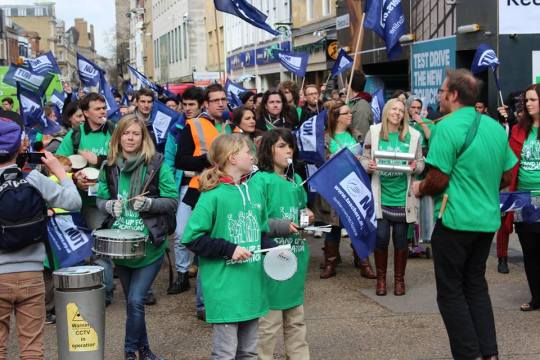Reflections from a marxist teacher active in the National Education Union (NEU) and rs21.org.uk
Don't wanna be here? Send us removal request.
Text
School strikes: results and prospects
After the vote to accept the government’s latest pay offer in schools, rs21 teachers and support staff analyse the strikes and their results, and lay out a plan for the months ahead. Save Our Schools march and rally, central London 15th March 2023. Credit: Steve Eason/Flickr. Voting has now closed in the NEU’s e-ballots on the 6.5 percent pay award. The result was an 86 percent vote to accept…

View On WordPress
2 notes
·
View notes
Text
Unsurprising but disappointing: NEU Wales votes to accept offer
NEU members have voted 70% in favour of accepting the deal in Wales. It's unfortunate, if unsurprising that the vote went the way it did.
Unsurprising because of the lead given by the NEU and lack of articulation for what we would/could do to secure something better. Having voted to reject once already it wasn't difficult to decode the "this is the best we think we can get" messages from the union leadership (regardless of there being no formal recommendation).
Disappointing because of the message it sends to the UK government about our leaderships weakening resolve and willingness to accept unconsolidated one off sums.
The way Wales has been handled has sent a ludicrously clear message to the government that the executive's decided we're to weak to sustain much more strike action. Communicating that so clearly means we're now likely to be presented with a weaker form of the Welsh deal in the current talks. The Welsh deal has set a maximum on what the government know they need to offer.
The exec vote against recommending rejection (with a plan to fight) was a significant tactical blunder. It was also a woeful lack of solidarity with the BMA who have held firm to the fight much more ambitious demands and called further days of action. That many will internalise this as having been 'the members' decision rather then a consequence of their national steer will make honestly assessing where we are difficult.
The tragedy is two fold
1) that all the indications from school meetings this week (including from our less organised schools) is that people are prepared to fight for more. There was no actual sign the strikes were weakening - but many signs the executive was. Our meetings across Oasis schools nationally have *all* reported people we're willing to take further days of action to secure a better offer.
2) That the entire debate around the Wales deal bore little relation to the actuality of the offer. This is because it was in effect a debate by proxy over the execs confidence in sustaining our national action. When (after the fact) the arguements over the Wales deal became clearer in became clear that the left executive members acceptance was more over a belief it could be dressed up and "sold" as motivating progress then any real belief it was qualitatively better then the deal already rejected.
What it means for the NEUleft
The challenge for the left on the exec is that they've largely tied themselves to the positions of the general secretaries. Our joint GS's, despite being drawn from different political wings of the union, have maintained a united front over how to proceed, and how to interpret what has been offered so far.
Despite some rhetorical differences their two favoured candidates (Daniel for the left, Niamh for what is led of the 'right) have in effect echoed the position of the current General Secretaries. This can only benefit Niamh and those around her candidacy who represent the voices in the union most skeptical about organising and building power, and most committed to the power of seeming respectable in the media ("good at media" to use their main campaign angle). That the GS election is likely to close during a debate over whether to accept a weak deal supported by both candidates is unlikely to provide the motivating spur we need to push Daniel over the line.
How we orientate to mobilise rejection of what is looking likely to be a bad offer in England (I dearly hope I'm wrong) whilst still mobilising people to vote for Daniel is likely to be a challenging task. That we're likely to be doing so with much of Daniel's campaign team silent on - or tacitly supporting - a poor deal will make it more so.
0 notes
Text
We need more than crumbs: reject the NEU 'deal' in Wales
Schools strikes are suspended in Wales following a new offer from the Welsh government. rs21 members in NEU explain why it’s a bad deal and argue for stepping up rank and file organisation. NEU marchers on 1 February – photo by Steve Eason. On Friday 10 March the NEU National Executive agreed to suspend next week’s strikes in Wales. The suspension is to allow time to put a ‘new’ offer from the…

View On WordPress
1 note
·
View note
Text
NEU action: building a strike day

Workers in Royal Mail and the railways have held several cycles of strikes over multiple days. Their strikes have been some of the of the most popular, and effective, in years. Both have remained solid despite facing a government blocking them reaching a deal.
My own union, the National Education Union (NEU), has an impressive record of political campaigning but limited experience of sustained strike action. While transport and postal workplaces can draw on their history and culture of industrial action we need to create one. Yet we are not starting from scratch; we also have our own experiences and strengths to build on.
Five ideas for a school strike
We're cautiously optimistic that our ballot has beaten the thresholds. By Monday 16th of January we will know the result and announce our first strike dates. To build momentum we'll need to hold school meetings as quickly as possible. Meetings focused on engaging members and building for our first day of action.
We need to start by asking people not "will you strike?" but "what can you do on the day?". The more members who are actively involved, the more activists we'll have to drive future days of action. A clear plan will make it easier to recruit people to the union and to the strike day.
1. Pickets as protests
Every area has a school in it. Every school should have a visible picket. A picket with union flags and banners raising our demands for fair pay and proper funding.
Guidelines around strikes state that there should be no more then six pickets standing by 'an entrance' but there is no limit on the number of members who can join a picket. With enough people we can picket the entrance and have a presence at the busiest points near the school focused on the wider public. Our pickets should have a whiff of a spirit of protest about them with music and leaflets to explain why we're out. The more people on the picket the more energy it will have, but even with two it's worth doing.
Pickets need to start early enough that anyone working on the strike day is aware they'll have to cross it. Ideally you want at least one person ready to put the argument about why to support the strike to anyone planning to go in.
Things to organise in advance: Communicate the times the picket will start and finish and a way of people signing up for when they can join from and to. Someone to sort and bring music. Someone to ask the local district for flags and materials. Some volunteers to make a banner to have at the most visible location on the picket. If there's going to be enough people then someone to contact the local press.
2. Strikers' breakfast
Most schools have a local cafe or coffee shop that staff use. A coffee and sit down provides a space for those that picketed to talk about how it went and those who weren't confident this time to dip their toe in. Spaces to 'assemble' and talk outside the routines of work or socialising with friends is central to consolidating a union group. Just as importantly it's a chance to warm up and gives people another point in the day to find you and join in.
Things to organise in advance: Communicate times people will be there and when you'll aim to leave. A way of people confirming they plan to be there. Someone to let the cafe /coffee shop what to expect in advance.
3. Joining the nearest demonstration as a group
One of the best aspects of previous teachers' strikes have been the local protests. Many schools are small workplaces, some Union groups are stronger then others but coming together on the demonstration gives confidence and a sense of being part of a much bigger campaign. This year we should be joining with other groups of workers striking back against the cost of living crisis. Joining as a group will help people get the most out of it.
Things to organise in advance: Check with the local NEU District where the protest is assembling and where it is heading. Arrange a time and place near the protest (which won't be swamped by the assembly of the protest) as a group. If travelling into a city consider arranging an assembly nearer the school for people to travel together and one nearer the protest for people who live further afield.
4. Book a space/table for a social
A place to get together and relax at the end of the demo. The most important part of taking part if forging new connections based on taking action. A space for conversations is key to forming a school group. Strike days should have a sense of fun and celebration.
Things to organise in advance: Someone to find a venue (a pub, bar or cafe) and book a table. Communicating the time you expect to get there and letting people know if they do food.
5. A plan for the next dates
The best time to sign people up for further action is when they've been lifted by taking action. Before the first strike day we need a plan for the next ones - and a school meeting before then if we need to reach out to more staff.
Building momentum is key. That means trying to get members to increase their involvement in future strike days and reaching out to those that didn't strike this time. Taking part in the day should give more members the confidence to convince others they should join the union and join the action. Ultimately we want everyone who's working in a school to strike. That means building a network which can carry discussions beyond the existing union group and throughout the school.
Things to organise in advance: A rough plan for the next days of action and a way of signing people up. A target list of people for other members to follow up. Who do we want to be more involved next time? Who might be convinced to take responsibility for doing something next time? Who didn't support us this time but might be convinced to support the next one?
0 notes
Text
Teachers Strike Ballot: Two weeks left
(picture: last national teachers strike in 2016)

On the final day of last term, after a tremendous push by National Education Union (NEU) activists and union staff, our ballot turnout was sitting at 46.5%; tantalisingly close to the 50% needed to beat the legal thresholds. The final results will be announced after the 13th January and we hope that last minute returns will push us over the line. Beating the thresholds in a national "aggregated" ballot (all teacher members balloted as a single group - not separating members out into different ballots for each employer/area) would be a huge achievement in itself. The Tories introduced the thresholds in the belief that they were impossible to overcome in a national ballot. The fact that several unions have done just that is a marker of how keenly the cost of living crisis is felt.
We are now three days away from returning to school and the final stages of the ballot. As a reasonably well networked NEU activist I'm not sure whether we'll hit, or just miss, the legal threshold. I've no doubt there will be a huge majority for strike action but even a 100% yes vote on a 49.99% would not count as several branches of the Royal College of Nursing recently found out.
My own NEU "branch" (technically proto-branch), Oasis Community Learning, is comfortably over the thresholds but that won't matter if we fail to turn out 50% nationally. This means the next few days will be a scramble for every vote we can get posted. However, beating the thresholds is only the first hurdle.
Next steps
Regardless of the bar set for turnout the ballot highlights the work that needs to be done to make us battle-ready. In our strongest workplaces reps quickly set about making the ballot a live issue which drove turnout. In weaker schools the ballot struggled to gain momentum. Nationally we've worked to overcome this, largely by phone banking individuals to push us over the line. But voting yes and organising to shut down a school are several steps apart. Too few of our schools are well organised with a visible rep who's held school meetings around the campaign.
When the results are in we need to shift quickly to articulating a strategy that poses a credible path to victory. This will require cohering a layer of reps and activists able to carry the argument within our membership, an argument about the level of strike action we might need and how to prepare ourselves for it. With our sister union's, NASWUT's, disaggregated ballot likely to miss thresholds it is probable the NEU will be taking action alone in most schools. That means the success or failure of any action - and how well we can sustain it - will rest on the NEU's organisation at school level.
What we can do
As the new term starts we need to be ready to conduct a school-wide argument over how to ensure our first strike days completely shut schools.
This means arranging school meetings for the week after the result to discuss a plan of action which commits as many people to taking part in the strike day as possible. In the first week back we need to be advertising these meetings and starting to have 1-2-1 conversations with key members. Our first meetings need to be large and engaged. To make that happen we need to make sure we have a core of members in each school ready to put forwards a plan for building the first strike day.
We also need to discuss how school groups will make the strikes themselves a collective event which engages as many members as possible. Starting to plan for large lively pickets, collectively joining local protests and getting together for post-protest socials. Members who strike, but stay at home are unlikely to develop the confidence needed to sustain more extended strike action. The more people we involve actively in the strike days the more we can build the collective will to take further action.
1 note
·
View note